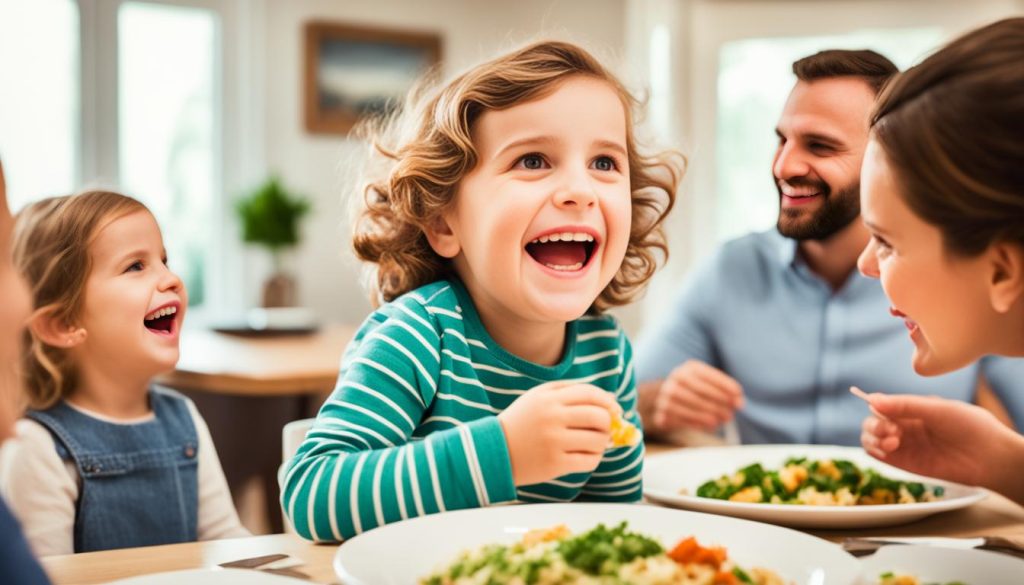Imagine the calm of a family at the dinner table. The smell of home-cooked food, laughter, and deep talks fill the air. In today’s fast-paced world, these moments are rare but very valuable. Even with busy lives and fast food options, making time for family meals is key for kids’ growth.
Studies show that family meals are crucial for a strong bond between parents and kids. A 2018 study found that kids who eat with their families often eat more fruits and veggies. They also avoid fast food and sugary drinks. These meals help teach kids good manners and how to talk with others, which is good for their development.
Family dinners also help kids’ mental health. A 2015 review found that eating together can protect kids from eating disorders, using drugs, and feeling sad. These meals are a safe space for kids to talk about their day, share stories, and feel supported.
Key Takeaways
- Regular family meals strengthen the parent-child bond and foster emotional security.
- Family mealtimes improve nutritional habits, increasing fruit and vegetable intake among children.
- Eating together provides a platform for better communication and sharing daily experiences.
- Frequent family dinners reduce the risk of childhood and adolescent mental health issues.
- Shared meals contribute to healthier weight management in children.
The Benefits of Family Mealtimes for Child Development
Sharing meals with family deeply affects a child’s growth, boosting their emotional health. A regular meal schedule and quality time at the table helps kids feel safe and smart about feelings. This time together is key for their emotional growth.
Emotional Security and Togetherness
Family meals make kids feel secure and connected. They offer a chance for parents to bond deeply with their kids. Kids feel stable and less anxious, which helps them grow emotionally.
Mealtimes let kids talk about their feelings and thoughts. This makes them feel important and boosts their self-confidence. Feeling heard and valued makes them feel they belong and are worthy.

Building Trust and Communication
Regular dinners build trust and better communication in families. They let parents share important values and set clear rules. Studies show that eating together often helps teens stay away from risky behaviors and improves parenting.
Talking during meals helps kids understand limits and speak up. These talks are key for emotional smarts. Plus, not using screens at dinner leads to deeper talks and stronger family bonds.
Talking at dinner is vital for kids’ social and emotional growth. They learn new words and see how to eat well from their parents. This helps them try new foods, eat in moderation, and be polite.
In short, regular family dinners are key to positive parenting. They help kids grow emotionally, build confidence, and improve communication. This routine creates a caring home where kids can flourish.
Positive Parenting Through Shared Meals
Sharing meals is a key way to teach important life skills. It helps kids grow in all areas, making the family stronger. Studies show that how we eat together affects kids’ mental health and social skills.

Teaching Healthy Communication Skills
At the dinner table, talking openly is key. Kids learn how to communicate well. Parents show them how to listen and speak right, helping kids learn to set boundaries in a caring way.
By watching and joining in, kids pick up these good habits. They get better at sharing their thoughts and feelings.
Promoting Respect and Empathy
Regular family meals build respect and empathy. During these times, parents use positive parenting to teach kids about respect and empathy. Kids learn to respect others and understand their feelings.
Fostering a Sense of Belonging
Having a set time for family meals makes kids feel they belong. This routine is great for their mental health, making everyone feel included. Feeling valued boosts their self-esteem and emotional safety, making the family closer.
| Aspect | Benefit |
|---|---|
| Healthy Communication | Children learn by example, engage in active listening, and articulate their thoughts. |
| Respect and Empathy | Observing and practicing mutual respect ensures children understand and value diverse opinions. |
| Sense of Belonging | Consistent family meals provide a stable environment, improving children’s emotional security. |
Mental Health Advantages of Eating Together
Regular family meals are key to supporting child mental health. They create a safe space for kids, giving them stability and emotional strength. Sharing meals leads to open talks that help manage tantrums and make kids feel heard and valued. This helps build resilience in kids by teaching them how to communicate well through tough times.

Studies reveal that kids who eat with their families are less likely to take risks. This habit is good for their mental health, cutting down on depression, substance use, and eating disorders. It also helps build stronger family ties. These bonds are key for fostering child independence in a caring setting.
Eating together does more than just feed the body; it’s good for the mind too. Meals without TV or screens lead to higher self-esteem and a sense of belonging. This leads to deeper conversations and fun times together. It helps kids have a healthy relationship with food, free from pressure, and supports emotional stability.
Research shows the benefits:
- Lower risk of behavioral issues
- Better academic performance and higher test scores
- Enhanced vocabulary and communication skills
The Family Dinner Project found that eating together often makes families work better and feel closer. Over 90% of parents see these meals as great for talking with their kids. But, sadly, less than half of Americans eat together often.
| Benefits | Impact |
|---|---|
| Reduced depression rates | Increased emotional well-being |
| Lower substance use | Higher academic performance |
| Better social skills | Stronger family bonds |
In short, regular family meals are crucial for building resilience in kids. They create a supportive environment for growth. This practice is key to supporting child mental health and helps ensure mental well-being for life.
Impact on Physical Health and Nutrition
Regular family meals are key for Child Nutrition and Development. They help kids develop Healthy Eating Habits and boost their physical health. These meals let kids learn to choose healthy foods, eat more fruits and veggies, and avoid processed foods. Starting these habits early sets kids up for a lifetime of good nutrition.

Healthy Eating Habits
Family meals are a great chance for parents to teach kids Healthy Eating Habits. When kids join in family meals, they tend to eat better. A study with 288 kids aged 6-12 showed:
- More healthy foods mean less junk food.
- Drinking light soft drinks is linked to better behavior.
- Less soft drink drinking means a more organized home.
Increased Fruit and Vegetable Intake
Adding more fruits and veggies to kids’ diets is crucial for their growth. The same study found:
- Eating more fruits and veggies means less parental overprotection.
- Structured homes lead to less soft drink drinking.
- Supportive homes encourage healthy eating and better nutrition.
Plus, kids who enjoy Benefits of Outdoor Play also get a boost in their health. These habits are key to avoiding obesity and other health problems in kids.
| Nutritional Factors | Correlations | Implications |
|---|---|---|
| Healthy Food Intake | Small positive (r = 0.123) | More balanced diets and fewer sweet foods |
| Fruit and Vegetable Intake | Small negative (r = -0.151) | Lower levels of overprotection |
| Soft Drinks Consumption | Small negative (r = -0.124) | More structured environments |
By making family meals a regular thing, you lay the groundwork for lasting Healthy Eating Habits. This supports overall health and Child Nutrition and Development.
Promoting Academic Success Through Family Dinners
Family dinners are key to helping kids do well in school. They create a supportive and engaging space. Sharing meals leads to talks that boost vocabulary and reading skills. Studies link regular family dinners with better grades, showing their big impact on Child Development Milestones.
Even short family dinners have a big effect. Kids who have 5 to 7 dinners a week with their families tend to get good grades. These dinners help kids develop a Growth Mindset for Kids, making them more eager to tackle challenges. They also help kids learn to keep learning throughout their lives.
Family dinners are great for Encouraging Child Creativity. Kids talk about their day and what’s happening in the world. This sparks their curiosity and helps them think critically. It also makes them better at reading and using words.
Parents being part of dinner helps kids do better in school. The National PTA says a supportive home and staying involved in school matters a lot. Kids with supportive parents feel more confident, motivated, and behave better in class.
Regular family dinners also lead to better behavior and less risk-taking. Teens who eat with their families often avoid alcohol, drugs, and bad behavior. This shows how important dinner is for kids’ growth.
| Family Dinner Frequency | Academic Performance | Behavioral Outcomes |
|---|---|---|
| 0-1 Dinner per week | Lower Grades | Higher Risk Behaviors |
| 5-7 Dinners per week | Mostly As and Bs | Lower Risk Behaviors |
In conclusion, making family dinners a priority can really help your child in school and life. Regular, meaningful talks at dinner are key to building important skills and values. These moments are truly valuable.
Teaching Responsibility and Independence
Family mealtimes are key in teaching kids responsibility and fostering child independence. Getting your kids involved in cooking and cleaning up teaches them important life skills. It also makes them feel like they’re contributing.
Sharing mealtime tasks helps set clear rules and builds gratitude. Studies show 65% of parents want their kids to be independent and confident. Helping with daily tasks prepares them for the future and teaches them about being responsible and resilient.
Kids who solve their own problems get better at it by 20%. Letting them make their own choices boosts their self-esteem by 78%. Encouraging them to take on more and try new things makes them more willing to take risks by 40%. And letting them make mistakes helps them become more resilient and adaptable by 15%.
Parents are key in teaching kids to take on more responsibility. By involving your kids in these tasks, you show them the value of caring for others. Teaching them to be thankful can deeply impact their growth.
Managing screen time is also vital for child independence. Limiting screen use during meals promotes talking face-to-face and values personal interaction. For more on handling sensitive topics like gun violence, check out this guide for parents. This kind of talk helps kids feel responsible, confident, and morally strong.
Building Self-Esteem in Children
Family meals are key to building self-esteem in kids. They’re a time when kids feel heard, valued, and recognized. Being part of mealtime talks helps kids see their importance in the family.
Listening and Valuing Children’s Opinions
A warm, loving home is vital for boosting kids’ self-esteem. When parents listen to and respect their kids’ views at meals, it sparks creativity and makes them feel seen. This kind of positive parenting makes kids more confident to share their thoughts, building a strong sense of self.
Studies show praising kids for their effort, not just results, helps them do better and feel better about themselves. Focusing on their strengths and supporting their growth also raises their self-esteem.
Encouraging Participation and Decision Making
Getting kids involved in meal planning and tasks boosts their self-esteem. It makes them feel important and connected. This teaches them about hard work and builds a sense of achievement.
A survey found 75% of parents think healthy friendships are key to high self-esteem in kids. Positive social interactions are big for a child’s self-image. Kids who help out at home or in the community see their value and feel better about themselves.
“Acknowledging efforts regardless of outcomes is important for building self-esteem. Balancing challenges with opportunities for success is beneficial for children’s growth.”
Showing kids unconditional love and acceptance is key to their self-esteem. A supportive environment lets them explore their interests and find who they are. This is crucial for their creativity to flourish.
Developing Social Skills and Manners
Family meals are key for teaching kids social skills and manners. The dinner table is where they learn patience, listening, and how to be polite. These skills help them in many areas of life.
A study in the American Journal of Public Health found that early social skills in kindergarten predict success later in life. Kids who learn social skills make friends easier and solve problems better. They also have a brighter future ahead.
Activities like sports and scouting teach kids to work together and see things from others’ views. But too much screen time can make it hard for them to connect with others. Not making eye contact can hurt their job chances later.
It’s important for kids to know when to step away from tough situations. The Tribhuvan School in Patna teaches kids valuable social skills. It’s key for their growth.
Teaching kids to be polite, like opening doors or giving up seats, shows respect. It helps them become kind and caring. This leads to happy childhoods and successful futures.
Handling Sensitive Topics at the Dinner Table
The family dinner table is a place where sensitive topics can be talked about safely. Parents can use this time to teach kids about diversity and how to handle sibling rivalry. A Washington Post article says talking about these topics in small, ongoing conversations is best. This helps kids think critically and solve problems.
Creating a Safe Space for Conversations
It’s important for kids to feel safe sharing their thoughts and feelings at the dinner table. The American Federation of Teachers recommends setting rules for respectful talks. Starting with “How” or “Why” questions helps kids think deeply about their thoughts.
This approach lets them share their ideas and learn to handle tough situations. It also helps them think critically outside the home.
Discussing Daily Experiences and Current Events
Family dinners are great for talking about everyday life and news that’s right for kids. This keeps everyone up to date and helps kids understand complex topics. Talking about money matters or big issues in the news prepares kids for the real world.
By staying neutral and showing different views, parents help kids form their own opinions. Making Friday nights for deep talks is a good tradition. It teaches kids empathy and emotional smarts, setting them up for a strong future.
FAQ
Why is family mealtime important for child development?
How do family meals enhance emotional security?
What role do family meals play in building trust and communication?
How do family meals integrate into positive parenting practices?
What mental health benefits do shared meals provide?
How do family meals affect a child’s nutrition and physical health?
Can family dinners enhance academic success in children?
How do family meals teach responsibility and independence?
In what ways do family meals contribute to building self-esteem in children?
Why are family meals critical for developing social skills and manners?
How can you handle sensitive topics at the dinner table?
This post contains affiliate links. If you click on a link and make a purchase, I may earn a small commission — at no extra cost to you. Thank you for supporting this blog and helping me keep the patterns free! Read the full Affiliate Disclosure & Transparency.
